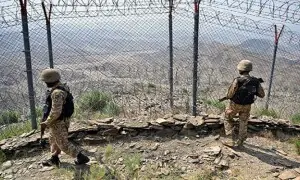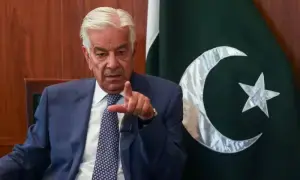Gen Zia's top aide Akhtar Abdur Rahman's name appears in Swiss bank leak
4 min readLeaked data from Swiss banking giant Credit Suisse has revealed that 15 intelligence figures from around the world, including Pakistan, or their close family members, held accounts at the investment banking company.
The leaked information was provided to German newspaper Süddeutsche Zeitung by an anonymous source. The paper then shared it with Organized Crime and Corruption Reporting Project, a consortium of investigative centers, media and journalists, and 46 other media partners around the world.
In a tweet, OCCRP said: "Leaked bank records show how Credit Suisse helped dictators, corrupt politicians, spies, and criminals hide their illicit fortunes."
"This is #SuisseSecrets, one of the world’s largest investigations into the world of Swiss banking," read the tweet.
Pakistan military ruler General Ziaul Haq's close aide General Akhtar Abdur Rahman's name was also in the list.
Rahman served as director general of Inter-Services Intelligence in the dictator's rule and had key role in US interventions in Afghanistan in backing anti-Soviet mujahideen in the late 1970s.
The report gave reference of heavy US and Saudi funding during the Soviet war, saying Akhtar's Credit Suisse accounts were opened by the mid-1980s in the names of his three sons. "Akhtar was adept at getting CIA cash into the hands of Afghan jihadists," read the report into investigation of leaked accounts.
The report cited Mohammad Yousaf, a colleague of Akhtar at the ISI. He penned a book about the time and wrote: “The combined [US and Saudi] funds, running into several hundred million dollars a year, were transferred by the CIA to special accounts in Pakistan under the control of ISI.”
Yousaf along with Steve Coll, who is the author of Ghost Wars, claimed Akhtar was the man who decided where this cash went. "To train the mujahideen in sophisticated weaponry, the CIA trusted him with millions. By 1984, the CIA’s Afghanistan budget alone was some $200 million," read the report.
“It was easy at that point in time to open Swiss banking accounts of any manner or type for transfer of overt funds,” a South Asian intelligence source with knowledge of Afghanistan operations was quoted in the OCCRP report.
“Akhtar was doing it to fill his own pockets,” the source said. “A lot of money was siphoned off from the Afghan war and into his bank accounts.”
According to the details of the bank accounts and money in it, the report stated: "One of the two Akhtar family accounts at Credit Suisse — held jointly by Akhtar’s sons Akbar, Ghazi, and Haroon — was opened on July 1, 1985, when the sons were in their late 20s and early 30s.
"That same year, US President Ronald Reagan would raise concerns about where the money intended for the mujahideen was going. By 2003, this account was worth at least five million Swiss francs ($3.7 million at the time). A second account, opened in January 1986 in Akbar’s name alone, was worth more than 9 million Swiss francs by November 2010 ($9.2 million at the time)."
In 1988 Akhtar died in the fateful plane crash that also claimed Zia's life.
Two sons of Akhtar, Akbar and Haroon, did not respond to OCCRP's requests for comment. His third son, Ghazi Khan, in a message to the consortium called information presented by reporters about the family’s Swiss accounts “not correct,” and said it was “denied,” but did not elaborate.
The Suisse Secrets data revealed that 15 intelligence figures from around the world, or their close family members, have held accounts at Credit Suisse. They included spy chiefs and their relatives from Jordan, Yemen, Iraq and Egypt. "Some have been accused of financial crimes, torture — or both," it added.
The leaked data covers over 18,000 accounts that were open from the 1940s until well into the last decade. Together, they held funds worth more than $100 billion.
Suisse Secrets is a collaborative journalism project based on leaked bank account data from Swiss banking giant Credit Suisse. "Reporters on five continents combed through thousands of bank records, interviewed insiders, regulators, and criminal prosecutors, and dug into court records and financial disclosures to corroborate their findings."
In response to the consortium's reports, Credit Suisse issued a statement on Sunday and said: "Credit Suisse strongly rejects the allegations and insinuations about the bank's purported business practices.
"The matters presented are predominantly historical ... and the accounts of these matters are based on partial, inaccurate or selective information taken out of context, resulting in tendentious interpretations of the bank's business conduct."
The bank said it had received "numerous inquiries" from the consortium in the past three weeks and reviewed many of the accounts in question.
"Approximately 90% of the reviewed accounts are today closed or were in the process of closure prior to receipt of the press inquiries, of which over 60% were closed before 2015," it said.
"Of the remaining active accounts, we are comfortable that appropriate due diligence, reviews and other control-related steps were taken in line with our current framework. We will continue to analyze the matters and take additional steps if necessary."
For the latest news, follow us on Twitter @Aaj_Urdu. We are also on Facebook, Instagram and YouTube.























Comments are closed on this story.